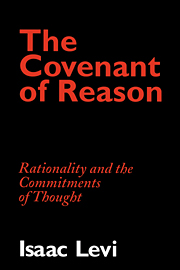Book contents
- Frontmatter
- Contents
- Introduction
- 1 Rationality and commitment
- 2 Rationality, prediction, and autonomous choice
- 3 The logic of full belief
- 4 Consequentialism and sequential choice
- 5 Prediction, deliberation, and correlated equilibrium
- 6 On indeterminate probabilities
- 7 Consensus as shared agreement and outcome of inquiry
- 8 Compromising Bayesianism: A plea for indeterminacy
- 9 Pareto unanimity and consensus
- 10 The paradoxes of Allais and Ellsberg
- 11 Conflict and inquiry
- 12 The ethics of controversy
- Name Index
- Subject Index
9 - Pareto unanimity and consensus
Published online by Cambridge University Press: 05 June 2012
- Frontmatter
- Contents
- Introduction
- 1 Rationality and commitment
- 2 Rationality, prediction, and autonomous choice
- 3 The logic of full belief
- 4 Consequentialism and sequential choice
- 5 Prediction, deliberation, and correlated equilibrium
- 6 On indeterminate probabilities
- 7 Consensus as shared agreement and outcome of inquiry
- 8 Compromising Bayesianism: A plea for indeterminacy
- 9 Pareto unanimity and consensus
- 10 The paradoxes of Allais and Ellsberg
- 11 Conflict and inquiry
- 12 The ethics of controversy
- Name Index
- Subject Index
Summary
T. Seidenfeld, J. B. Kadane, and M. Schervish have published an important paper on consensual decision making. These authors contend that the consensual preference among available options ought to preserve those comparisons among available options which all parties to consensus agree in making. Pareto unanimity ought, in this sense, to be a constraint on consensual decision making.
Seidenfeld, Kadane, and Schervish then consider situations where there are two agents (they speak of Dick and Jane) concerned to fix on a consensus, who face so-called horse lotteries in the technical sense of F. J. Anscombe and R. Aumann over two states. If Dick and Jane share the same probability distribution over the states but different utility assignments to the prizes, Pareto unanimity requires that every utility function defined over the prizes which is a permissible resolution of the differences between Dick's utility and Jane's must be a positive affine transformation of a weighted average of Dick's utility and Jane's utility. The set of permissible utility functions will be the set of all such weighted averages. It satisfies the convexity requirement on permissible utility functions which I advocated in “On Indeterminate Probabilities.” If Dick and Jane share the utility but have different probabilities, Pareto unanimity requires that every permissible probability be a weighted average of Dick's and Jane's. Again, the set of such permissible probabilities satisfies the convexity requirement.
Consider, however, the case where both the probabilities and the utilities of Dick and Jane differ in some respect.
- Type
- Chapter
- Information
- The Covenant of ReasonRationality and the Commitments of Thought, pp. 173 - 184Publisher: Cambridge University PressPrint publication year: 1997



